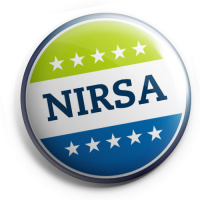Biography/Summary Resume
Robert Simels enters his ninth year as the Director of Recreation at The College of New Jersey (TCNJ). He previously worked two years as Director of Recreation at Dickinson College and 3 years at Indiana University South Bend in multiple leadership roles. Simels started in collegiate recreation through intramural sports and sport clubs. In his current role at TCNJ, he expanded the program to four full time staff members from a one person shop when he started. His focus and success have been expanding the access to recreation for the TCNJ community to benefit the well-being of students that the programs and facilities provide.
Rob has presented at many state, regional and national conferences and has been an active member in NIRSA since 2006. He is currently serving as New Jersey State Director for the second time and has focused on NIRSA Region 1 leadership over the past few years. This has included chairing the Region 1 Scholarship Committee for two year, chairing the Region 1 Conference Think Tank and currently chairing the Region 1 Finance Committee. At the national level Simels has been a member of the Small Program Committee, the NIRSA Championship Series Student/Professional Development Work Team, and has been active in NIRSA foundation events.
Rob lives with his wife of 11 years Kelli, and their two daughters, Madison (7) and Gabriella (2) in Belle Mead, NJ.
What do you see as opportunities in collegiate recreation and our Association? How would you collaborate with the Member Network team to address these issues?
The last few years has shown the importance of focusing on the well-being of our students, faculty and staff and that our roles in collegiate recreation are vital on college campuses. NIRSA has done a great job in providing the members the information about how collegiate recreation benefits well-being, and how positive well-being leads to student success. It would be our job in the Member Network to provide the members of our region with ways to utilize these resources, and to continue to promote this in the region. This can be done by providing examples of how schools have successfully leveraged the information to benefit their programs. In this realm, I know we also have the opportunity to continue to expand the NIRSA partnerships to facilitate ways the Member Network team can work together to identify organizations that can help our member institutions and individuals in providing well-being and EDI practices to campus.
As we navigate the future of higher education and the changing view of college, one area that has become a focus is the career readiness of graduating students. This is one area that NIRSA has focused on throughout its history, and is an area that we can use as an opportunity to promote both collegiate recreation’s importance on campus, and the impact of being part of NIRSA. We have the opportunity to not just talk about the benefit to our student staff and leaders, but expand on this by emphasizing and clearly communicating the impact on career readiness that our participants gain.
Along with changing views of higher education, the demographics of college students will continue to change over the next few years. Collegiate recreation and our association have the opportunity to be leaders on campuses by providing programs, services and facilities to support the success of all students. NIRSA has already focused on providing members with education on how we can integrate EDI into our work. This will set us up, along with our focus on well-being and career readiness, to be pivotal in the college experience of our students. Many of our member institutions are already working to better meet the needs of a broad range of student demographics, which can also include differences in the ages of students, and increases in the number of commuter students and students who will have more off campus responsibilities. Now is our opportunity to collaborate and continue to learn from each other to adapt to the diverse student needs on our campuses.
To this end, it is important that if I am the elected Region 1 Member Network Representative, I first asses the strengths and challenges of the region, and then act as a conduit to connect regional leadership with members of the region, and be the voice of the region to share regional approaches and successes with the rest of the Member Network in order to broaden communication and collaboration even further.
In describing your contributions to NIRSA, identify how your involvement and experiences meet the position criteria and qualify you to serve NISRA in this role.
When I first came into the field as a professional, I felt that the biggest impact I could make to NIRSA was being involved as much as possible at the national level. As a member of the small school and community college committee (now the small program committee), I found a place where I was able to start contributing to expand the voice and impact small programs could have within NIRSA. I also tried to be involved with other national committees, focusing on student and professional development, which are areas I feel are vital to the student success not only in collegiate recreation, but in life.
More recently, especially since I started my Director’s role at TCNJ, I have realized that focusing my efforts on Region 1 could make a larger impact, and expanded my role within NIRSA Region 1 leadership. This has included two stints as the New Jersey State Director and chairing multiple committees that had direct impact on members of Region 1. As the chair of the Region 1 Contingency Fund Scholarship Committee, the committee was able to expand the number of scholarships and provide more opportunities for Region 1 members to attend NIRSA events. Through direct discussions, and the creation of materials for leaders to utilize to educate fellow members about opportunities, I was able to successfully communicate with Region 1 members to promote the scholarships. The results of this work was an increase in the number of applicants for scholarships, which led to the committee being allocated a larger budget due to want. Thus, this role also helped me to gain a stronger understanding of the finances of NIRSA and Region 1.
In role of Chair of the Region 1 Conference Think Tank in 2020 – 2021, and my current role as Chair of the R1 Finance Committee, I have furthered my NIRSA education, and I have had significant input on changes happening in Region 1 and NIRSA as a whole. In these roles I have demonstrated the ability to bring groups together and then create and work through committee charges to present information and proposals to Region 1 leadership for approval. These included developing a framework document to help with a new structure for location and host committee structure for the Region 1 conference. I was also successful in working with the finance committee to amend the MOU for the Region 1 Foundation Scholarships along with creating the Region 1 Leadership Endowment to support members going to the Region 1 conference. Working on these committees has allowed me to gain a deeper understanding of NIRSA changes that Region 1 members will see, and I feel my knowledge and input in working through the changes allows me to take on the Region 1 Member Network Representative position, and continue the positive work that has started.
Please share your ideas for engaging volunteers and identifying leaders in your region.
The engagement of volunteers at the regional and national level is vital to the health of NIRSA and our development. We have great volunteers in our organization and region that continue to step up and work to enhance our experience within NIRSA, but we always need new people to proceed with our work, and to add different perspectives and ideas to this work. One way to engage our members is to be transparent and proactive about the important work that our committees are doing. This outreach to engage future volunteers and leaders can be done at the regional level by our committees discussing their work and charges at Regional and state meetings, which would also give potential new volunteers the opportunity to ask questions about the work. I think we can also do this virtually through updates on committees in newsletters and spotlighting volunteers and how their work has made an impact on NIRSA and their individual career development.
Further, we need to have our current leaders and volunteers help us recruit for the future. Our regional committee structure allows for new volunteers to get involved every year and our outgoing members could help members who could be a good fit for certain committees, and help in recruiting new members or aspiring leaders by encouraging them to apply to be on committees. This can also be done by regional members who sit on broader NIRSA committees and work teams.



